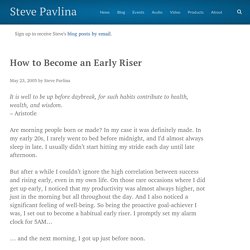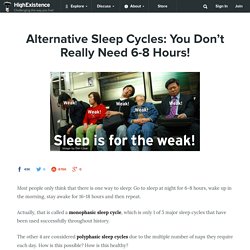

How to Become an Early Riser. It is well to be up before daybreak, for such habits contribute to health, wealth, and wisdom. – Aristotle Are morning people born or made?

In my case it was definitely made. In my early 20s, I rarely went to bed before midnight, and I’d almost always sleep in late. I usually didn’t start hitting my stride each day until late afternoon. But after a while I couldn’t ignore the high correlation between success and rising early, even in my own life. . … and the next morning, I got up just before noon.
Hmmm… I tried again many more times, each time not getting very far with it. It’s hard to become an early riser using the wrong strategy. The most common wrong strategy is this: You assume that if you’re going to get up earlier, you’d better go to bed earlier. It seems there are two main schools of thought about sleep patterns. The second school says you should listen to your body’s needs and go to bed when you’re tired and get up when you naturally wake up. 21 Habits of Happy People. Contributed by Cindy Holbrook “Happiness is a habit – cultivate it.” ~ Elbert Hubbar Happiness is one aspiration all people share.

No one wants to be sad and depressed. We’ve all seen people who are always happy – even amidst agonizing life trials. I’m not saying happy people don’t feel grief, sorrow or sadness; they just don’t let it overtake their life. 1. Be thankful that you woke up alive each morning. 2. Surround yourself with happy, positive people who share your values and goals. 3. Accept others for who they are as well as where they are in life. 4. Keep up to date with the latest news regarding your career and hobbies. 5. Don’t wallow in self-pity. 6. Some statistics show that 80% of people dislike their jobs! The secret to long life? Starve yourself on alternate days to boost brain power and shed weight. By Pamela Owen Updated: 08:40 GMT, 20 February 2012 Starving yourself on alternate days can make you live longer, according to scientists.

A group of Americans have said that fasting on and off can boost brain power and help to lose weight at the same time. The National Institutes for Aging said their research was based on giving animals the bare minimum of calories required to keep them alive and results showed they lived up to twice as long. Nothing for me today: Starving yourself on alternate days can make you live longer, according to scientists The diet has since been tested on humans and appears to protect the heart, circulatory system and brain against age-related diseases like Alzheimer's. 'Dietery energy restriction extends lifespan and protects the brain and cardiovascular system against age-related disease,' said Mark Mattson, head of the laboratory of neurosciences at the NIA and professor of neuroscience at John Hopkins University in Baltimore.
Alternate Sleep Cycles. Most people only think that there is one way to sleep: Go to sleep at night for 6-8 hours, wake up in the morning, stay awake for 16-18 hours and then repeat.

Actually, that is called a monophasic sleep cycle, which is only 1 of 5 major sleep cycles that have been used successfully throughout history. The other 4 are considered polyphasic sleep cycles due to the multiple number of naps they require each day. How is this possible? How is this healthy? Well the most important of every sleep cycle is the Stage 4 REM (Rapid Eye Movement) sleep, which has been shown to provide the benefits of sleep to the brain above all other stages of sleep. This way, you still get the benefits of 8 hours of sleep without wasting all of the time it takes to get to REM cycles, resulting in a much more efficient sleep cycle. Uberman Cycle: 20 to 30 minute naps every 4 hours, resulting in 6 naps each day.
Everyman Cycle: One longer “core” nap that is supplemented with several 20-30 minute naps. Dymaxion Cycle: